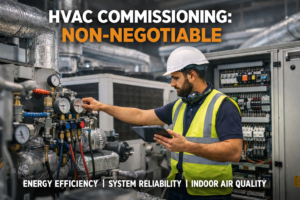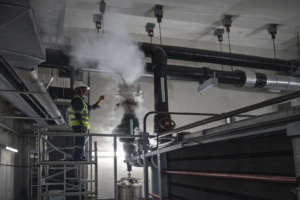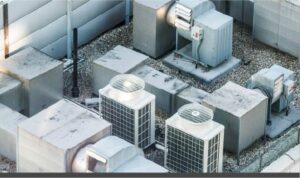Understanding Commercial HVAC Systems
Blog
August 8, 2025

Commercial vs. Residential HVAC Systems: Key Differences and What to Consider in Dubai
When it comes to heating, ventilation, and air conditioning (HVAC) systems, commercial and residential setups differ significantly in design, installation, and functionality. In Dubai’s unique climate, which demands high-performance cooling, understanding these differences is essential to selecting the right HVAC system for your needs. Whether you’re a business owner or a homeowner, this guide by MOLTEN explains the distinctions and factors to consider, helping you make an informed choice.
Understanding Commercial HVAC Systems
Commercial HVAC systems are specifically designed to serve larger spaces, such as office buildings, malls, hotels, and warehouses. These systems require greater capacity and flexibility to manage the demands of varied environments within one structure.
- Designing & Testing and Commissioning: In commercial air conditioning systems, it is essential to perform accurate heat load calculations, prevent heat gain from external sources, and ensure thorough testing and commissioning. This includes air balancing, water balancing, and duct leak testing.
- Size and Complexity: Commercial systems are generally much larger and more complex than residential systems to meet the needs of large spaces and multiple rooms. They are often modular, meaning they can be customized and expanded according to the building’s requirements.
- Zoning and Flexibility: Commercial HVAC systems usually allow for zoning, meaning that temperature control can be customized in different areas of the building. For example, conference rooms, lobbies, and individual offices may require different temperature settings, which is achievable through advanced commercial HVAC setups.
- Maintenance Needs: Due to their larger size and complexity, commercial HVAC systems require regular maintenance by certified technicians to prevent breakdowns and ensure optimal performance. With Dubai’s extreme temperatures, regular maintenance is essential to avoid disruptions and manage energy costs.
Understanding Residential HVAC Systems
Residential HVAC systems are designed for private homes and typically cater to smaller spaces. They are built with a focus on simplicity and ease of use, suitable for cooling and heating single-family homes, villas, or apartments.
- System Type:
Residential systems are often single-unit systems (like split systems or window units) and are designed to cool or heat one space or a small number of rooms. They don’t require the same level of zoning or flexibility as commercial systems, making them simpler and more affordable. - Efficiency and Noise Control:
Residential units are generally quieter, as they are built to fit seamlessly into living environments without causing disturbances. Energy efficiency is also a key focus, as residential users often prioritize lower utility bills. - Maintenance Requirements:
Residential systems are simpler to maintain than commercial setups, requiring basic cleaning and filter replacement. However, given Dubai’s dusty environment, it’s still essential for homeowners to schedule routine maintenance to ensure efficient cooling performance.
Testing & Commissioning in residential projects, testing and commissioning are crucial, including air balancing, water balancing, and duct leak testing. Improper air balancing can lead to issues such as unpleasant odors, mold growth on walls due to humidity, infiltration of unconditioned air, and insufficient fresh air supply.
Key Differences Between Commercial and Residential HVAC Systems
- Size and Capacity:
Commercial systems have a higher capacity to serve large spaces, while residential systems are compact and tailored for smaller areas. - Design and Installation Complexity:
Commercial systems are modular and often require professional design and installation. Residential systems are more straightforward and require less specialized installation. - Zoning Options:
Zoning is crucial in commercial spaces to ensure different areas receive customized temperatures, whereas residential systems typically cool or heat entire homes without specific zones. - Maintenance Frequency:
Commercial HVAC systems require frequent professional maintenance due to their size and complexity, while residential systems need less intensive upkeep. - Energy Usage and Cost:
Due to the size and scope of commercial HVAC systems, they consume more energy and thus come with higher operational costs. However, energy-efficient technology can significantly reduce these expenses over time.
Testing & Commissioning Is crucial for any HVAC Systems, especially in residential projects improper testing and commissioning in HVAC Systems, Improper air balancing can lead to issues such as unpleasant odors, mold growth on walls due to humidity, infiltration of unconditioned air, and insufficient fresh air supply.
Factors to Consider for HVAC Systems in Dubai
Choosing the right HVAC system for Dubai’s unique climate is essential for comfort and energy efficiency. Here are some key considerations for both residential and commercial setups:
For Commercial Spaces
- System Capacity:
Choose an HVAC system with sufficient capacity to handle large spaces and frequent usage, especially during Dubai’s summer months. - Energy Efficiency:
Given high energy costs, consider energy-efficient systems with modern technologies, such as variable refrigerant flow (VRF) and smart thermostats, which allow for better control over energy usage. - Humidity Control:
High humidity levels in Dubai can impact indoor air quality. Commercial systems with humidity control features help maintain a comfortable environment and reduce the risk of mold growth.
For Residential Spaces
- Size of the Space:
Select a system based on the size of your home. Split AC units are ideal for single rooms, while centralized systems are best for larger homes with multiple rooms. - Quiet Operation:
Homeowners typically prioritize quieter systems, especially for bedrooms and living areas. Many residential HVAC units offer noise reduction features to maintain comfort without disruption. - Maintenance Schedule:
Routine maintenance, such as filter cleaning and coil inspection, is essential in Dubai’s dusty environment to keep the system functioning efficiently.
Why Choose MOLTEN for Your HVAC Needs in Dubai?
MOLTEN provides precise, site-specific measurements using our calibrated testing and commissioning instruments, along with skilled technicians and engineers. Many HVAC companies rely on MOLTEN’s expert advice and consultancy to solve the most complex HVAC challenges in Dubai,
At MOLTEN, we specialize in providing tailored HVAC solutions for both residential and commercial clients across Dubai. We understand the unique climate challenges and have the expertise to recommend and install the best systems for optimal comfort and energy efficiency. Whether you’re looking for a compact unit for your home or a robust system for a commercial space, our team is here to guide you through every step.
Contact us today to schedule a consultation and discover how MOLTEN can help you find the perfect HVAC system to match your specific needs in Dubai.
By Pushparaj Poojari
Projects Coordinator
MOLTEN
.png) BACK TO ALL POSTS
BACK TO ALL POSTS
 +971 43 38 3155
+971 43 38 3155 info@moltents.com
info@moltents.com Al Quoz Industrial Area 03, Dubai, UAE
Al Quoz Industrial Area 03, Dubai, UAE








